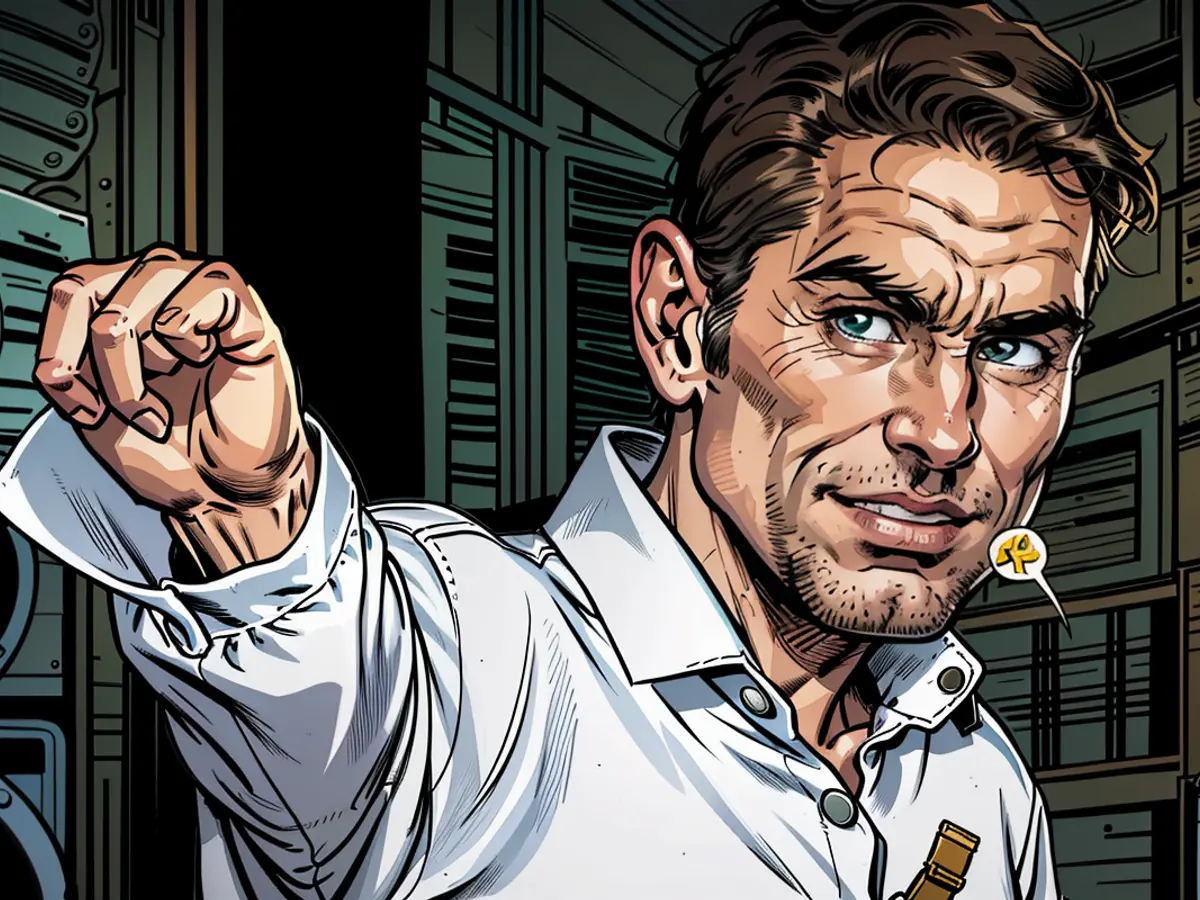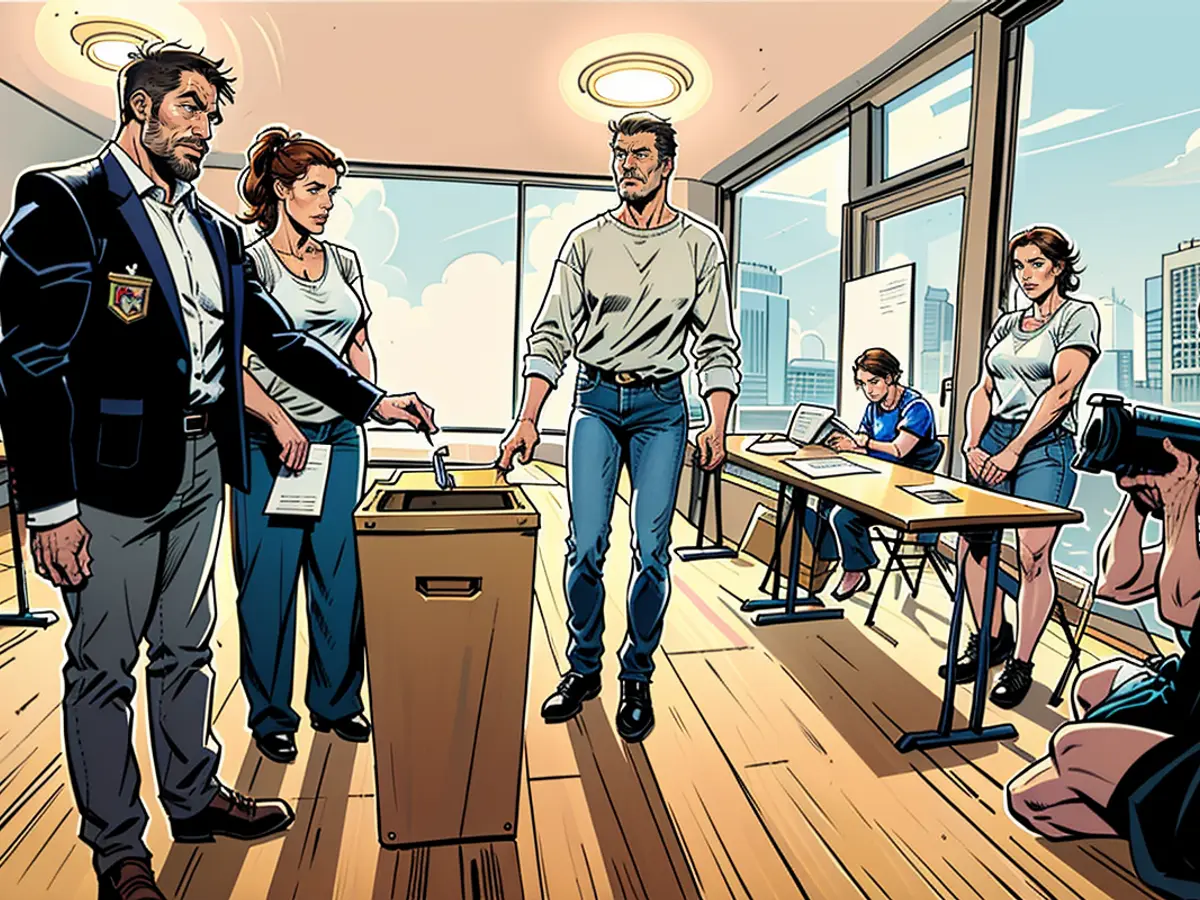At 19:08, Wagenkrecht advocates for creating a coalition with the CDU and potentially the SPD in Thuringia
Leader of BSW, Sahra Wagenknecht, aims for coalition with CDU and possibly SPD in Thuringia According to Wagenknecht, speaking on ARD, she hopes to form a solid government with the CDU, likely also including the SPD, in Thuringia. After five years of minimal government, people are yearning for a reliable majority government to address issues like significant teacher absences in the region. Additionally, they seek a state government that will represent them at the federal level, advocating for peace, diplomacy, and opposing the placement of US missiles in Germany. Wagenknecht has explicitly ruled out any coalitions with the AfD in Thuringia.
19:02 Projection for Saxony: AfD sees further enhancement in results Predictions for Saxony's election results indicate that the AfD may even surpass initial estimates. It's projected that the far-right party earns an impressive 33.1% of votes in the state. The CDU follows behind with 24.3%, while Wagenknecht's alliance garners 15% from scratch. The Left, currently leading with Minister President Bodo Ramelow, experiences a significant drop and lands at 11.7%. The SPD comes in at 6.6%, and the Greens earn just 4% of votes.
18:56 Göring-Eckardt: AfD's success shocks Green Party Members of the Green Party are more affected by the AfD's success in Thuringia than their own defeat. Green Party parliamentary leader, Katrin Göring-Eckardt, views the AfD's success as a "jolt" in Germany. Party leader Omid Nouripour calls his party's struggle "minimal" compared to the impact of the AfD's strengthened position, now being the most influential party in a state parliament.
18:48 Kretschmer: "Cause for celebration" in Saxony Saxony's incumbent Minister President, Michael Kretschmer, views the CDU as the cornerstone for the government coalition. Kretschmer, speaking at his party's celebration event, states, "We have every reason to celebrate." The people of Saxony have maintained their trust in the CDU and did not resort to a protest vote. "We understand the frustration with the situation in Berlin," Kretschmer acknowledged.
18:39 Saxony's Projection: CDU's lead narrows over AfD Initial projections from ZDF suggest that the CDU's lead over the AfD in Saxony's elections is narrowing: The CDU now only slightly surpasses the AfD with 31.9% to 31.3% of votes cast. BSW comes in at 11.6%, while the SPD earns 7.8%. The Greens barely make it into the state parliament with 5.2%, while the Left falls beneath 4.5%.

18:33 Weidel: AfD seeks government participation in Thuringia and Saxony AfD federal party chairwoman, Alice Weidel, claims the right to participate in government in both Thuringia and Saxony. According to Weidel, the voters wish for the AfD to be involved in the government, as they represent 30% of the voters in both states, and a stable government cannot be established without them.
18:30 SPD Secretary-General: "Election night not for celebration" SPD Secretary-General Kevin Kühnert acknowledges his party's modest results in the elections in Thuringia and Saxony. He shares his disappointment, following the election night, while also accepting that for years, the SPD has had a tough time. "There was a genuine risk of being kicked out of the state parliaments." Kühnert emphasizes that fighting is worth it, and the SPD is needed. He advocates for change, emphasizing the importance of explaining themselves to voters and actively engaging more. When asked about Chancellor Olaf Scholz, he stresses the necessity of jointly communicating their policies.
18:23 Höcke: Thuringia result a "historic victory" AfD faction leader, Björn Höcke, celebrates Thuringia's results as "historic," declaring an end to the "silly firewall nonsense." According to Höcke, change will only take place with the AfD.
18:23 Chrupalla on Thuringia: "Close to a tie with the CDU" AfD party leader Tino Chrupalla views his party's results as impressive, representing a political shift in both states. The AfD is reportedly open to discussions with all parties, while acknowledging their competitive standing with the CDU in Saxony, aiming for politics that benefit the people of Saxony.

18:17 CDU Secretary-General: No alliance with AfDCDU Secretary-General Carsten Linnemann declared that the CDU in Thuringia and Saxony will not form coalitions with the AfD. He mentioned, "We are incredibly clear about that." The CDU aims to form governments from the heart of the parliament, expressing optimism for its success. The CDU remains as the last major party, while the 'traffic light' parties have faced punishment.
18:13 Initial projection for Saxony: CDU slightly leads AfD, BSW at 12%, Greens struggleBased on the initial projection for the Saxony state election, the CDU holds the lead with 31.5% of the votes, just ahead of AfD with 30%. The BSW secures the third strongest position with 12%, while the SPD maintains a presence in the state parliament with 8.5%. The Greens sustain a tight grip on entry with 5.5%. The Left and FDP fail to enter the new parliament.
18:10 Initial projection for Thuringia: AfD outperforms CDU, BSW scores 16%According to the initial projection for the Thuringia state election, the AfD prevails with 30.5% of the votes, tailed by CDU with 24.5%. The Left gains 12.5%, giving the SPD a spot in the state parliament at 7%. The BSW is assured to enter the state parliament with 16%, with the Greens and FDP barely eclipsing the 5% threshold.
18:01 AfD leads in Thuringia, BSW in double digits in SaxonyBased on the initial projection after the Thuringia state election, the AfD emerges as the dominant force. The SPD surpasses the 5% threshold, while the Greens and FDP struggle to do so. In Saxony, the BSW records a double-digit score unexpectedly. The CDU narrowly edges ahead of the AfD. The projection indicates that the Left and FDP no longer secure seats in the state parliament, while the Greens persist.

17:18 Höcke's entry into the state parliament uncertainAmidst the success of his AfD colleagues in Thuringia, Björn Höcke could miss securing a seat in the future state parliament. Competing against the CDU's Christian Tischner in the Greiz II constituency, Höcke finds himself in close competition. If Tischner wins, and the AfD clinches additional direct mandates, then none can enter the parliament by virtue of the state list, including Höcke, who is listed first. The AfD may try to persuade an accomplished direct candidate to relinquish their seat, ensuring Höcke's entry.
16:48 Thuringian AfD opts to discard media coverageMedia coverage of the Thuringian AfD's election party appears unlikely, given their intent to exclude selected media outlets. Owing to legal impediments, the party excluded the entire press from the event. However, the decision was overruled by the court, compelling the entire press exclusion. A spokesperson cited space-related concerns, attributing the restriction to insufficient space at the event location.
16:29 Approximately a quarter of Saxony voters cast ballots via mailFor the "crucial" election called by Saxony's CDU Minister President Michael Kretschmer, approximately 24.6% of eligible voters have already submitted their votes by mail. Voter turnout remains comparable to that of 2019.
15:52 Höcke and Ramelow vote respectivelyThuringia's AfD state leader Björn Höcke and state Minister President Bodo Ramelow cast their ballots. Höcke visited Bornhagen in the Eichsfeld district and voted there, while Ramelow voted in the state capital of Erfurt along with his wife Germana Alberti vom Hofe.

15:40 Higher voter turnout than in 2019In Thuringia, 44.4% of voters had cast their votes by 2:00 PM, marking an increase of over two points compared to the 2019 election. This indicates a high turnout, yet mail-in voters are yet unaccounted for. In Saxony, the turnout also surpasses 2019's figures, although expectations lie in a higher number of mail-in voters. Both polling stations in both states will close at 6:00 PM.
15:13 "Kretschmer hopes that traffic light parties will still make it into the state parliament"
14:40 Top priorities for Saxony and Thuringia votersAlmost a third of the population in Saxony and Thuringia expresses intentions to vote for the AfD in the September 1 elections. A comprehensive survey sheds light on this trend, highlighting the most pressing concerns and challenges people face. Apart from migration, other issues such as labor market conditions, welfare, and healthcare emerge as major concerns.
14:13 Höcke expedites vote castIn the Thuringia state election, AfD's prominent figure, Björn Höcke, makes a quick appearance at the polling station in Bornhagen around noon. The extreme right leader moves on swiftly and avoids interacting with journalists at the scene. Previously, he usually fell short to the CDU candidate in his constituency of Eichsfeld, prompting him to switch to the Greiz constituency this time. However, he's anticipated to face another defeat against the CDU there.

13:50 Midday turnout in Thuringia mirrors 2019 levelsThuringia's midday turnout in the parliamentary election appears on track to match the figures from 2019. Around 32% of eligible voters had voted by 12 pm, according to the election commissioner, without accounting for postal votes. In 2019, the midday turnout was 31.2%. The election seems to have garnered more interest than earlier European and local elections. In June, only 24.3% of eligible voters had cast their ballots by midday.
13:29 High voter turnout expected in SaxonyThe Saxony state election sees a high turnout with 25.8% of eligible voters having cast their ballots by midday, reported by the Statistical State Office in Kamenz. In the 2019 state election, the turnout was 26.2%. Although postal votes aren't included in these numbers, an estimated 24.6% of eligible voters are predicted to vote by post. In 2019, postal turnout was 16.9%. The election process seems to progress without any disruptions.
13:11 Election outcome might undermine Berlin coalition - AnalystThe election outcomes for Saxony and Thuringia aren't finalized yet. Political scientist Albrecht von Lucke tells ntv that if the SPD fails to enter the state parliament, it would be almost like an "earthquake." In an interview, he discusses the election and its potential impacts.
12:44 Polling station threat investigated by policeGera police are investigating a threat at a polling station. A man wearing an AfD T-shirt entered to vote in the morning, but the polling station manager requested him to remove the shirt due to party advertising restrictions. Despite complying, the man expressed dissatisfaction and threatened to return. Police took a statement and warned the man. Additionally, police in Erfurt look into political graffiti ("Höcke is a Nazi") near polling stations as suspected cases of vandalism.

12:15 Correctiv warns against circulating false newsResearch network Correctiv warns against a false news story circulating again, claiming that signing the ballot paper prevents vote-rigging. However, the Federal Returning Officer's office clarified to Correctiv that "signing the ballot paper by the voter can jeopardize the secrecy of the vote, invalidating the entire ballot paper."
11:51 Voigt expresses hope for "stability in majority relations"Thuringia's CDU top candidate, Mario Voigt, has now voted. He wishes for "many Thuringians to exercise their right to shape our country's future" and hopes for "stable majority relationships" to propel the state forward.
11:25 Sonneberg witnesses explosion in right-wing extremist attacksSonneberg is the first district in Germany led by an AfD politician. Citizens involved in civic activities report experiencing increased threats, causing many to leave their jobs. Right-wing extremist attacks are said to have surged fivefold in one year. Experts attribute this trend to Sonneberg's AfD district administrator.
10:57 Kretschmer emphasizes the significance of electionSaxony's Minister President, Michael Kretschmer, describes the state parliamentary election as "arguably the most important election in 34 years." He thanks those who changed their voting patterns and supported the "strong force in the bourgeois center," referring to the Saxon Union. Kretschmer believes a government can be formed with such support. In recent polls, his CDU is neck and neck with the AfD.

10:30 Ramelow denies Wagenknecht's candidacyThuringia's Minister President, Bodo Ramelow, reckons election day is "a festival of democracy," despite the risk of not being re-elected. In an ntv interview, Ramelow argues against recommending a minority government and expresses doubts about the competence of the BSW.
09:59 Historian criticizes election date for reminiscent of 1939Historian Peter Oliver Loew criticizes the election date for the state elections in Saxony and Thuringia on the 85th anniversary of the German invasion of Poland in 1939. "Anyone who thought it was a good idea to hold elections on September 1st had no historical sensitivity," says Loew, the director of the German Polish Institute, to the Redaktionsnetzwerk Deutschland (RND). Loew expressed concern about the AfD, categorized as "firmly right-wing extremist" by the domestic intelligence services in both states, potentially being victorious in Dresden and Erfurt, whose ties to the Nazi era are ambiguous.
09:30 "Crucial vote": All data for the Saxony state voteOver 3.3 million eligible voters in Saxony have the chance today to decide who will shape the political future of the Dresden state parliament. The CDU might lose its title as the strongest force in the state for the first time since 1990, as stated by Saxony's Minister President Michael Kretschmer, who refers to the election as "crucial." "Everything is at stake."
09:05 Kretschmer criticizes traffic light of "hasty moves before the vote"With the Saxony elections underway, it remains to be seen if Minister President Michael Kretschmer will continue the CDU's successful streak in the state. In an interview on ntv, he discusses his stance on the refugee debate, the traffic light government, and the Ukraine war.

08:24 Is there a risk of the AfD undermining democracy?
According to polls, the AfD is likely to gain significant influence in the upcoming elections in Saxony and Thuringia. Such developments pose a threat to democratic institutions, as pointed out by a research group. The rule of law may not be as robust as some believe.
08:00 Polling stations open in Thuringia and Saxony
New state parliaments will be chosen today in Thuringia and Saxony. In predictions, the AfD is leading in Thuringia. In Saxony, the CDU under Michael Kretschmer and the AfD are neck and neck. Projections are expected once polling stations close at 6 pm. The elections in these two eastern German states also serve as a gauge for the traffic light coalition in Berlin.
For the current Thuringia coalition led by Minister President Bodo Ramelow (Left), no majority is evident in the polls. A potential post-election arrangement could be a government involving the CDU, Sahra Wagenknecht's (BSW) alliance, and the SPD. In Saxony, it remains uncertain whether the current coalition of CDU, SPD, and Greens still holds a majority. Kretschmer is open to an alliance with the BSW. The Left party faces the risk of being ousted from the Saxony parliament. Similarly, the Greens and FDP in Thuringia may face expulsion.
- In the given context, Elections to the Landtag of Thuringia could potentially result in Sahra Wagenknecht forming a coalition government with the CDU and possibly SPD, as she aims to bring stability to the region by addressing issues such as teacher absences.
- After the successful election results in Thuringia, the AfD has expressed its desire to participate in forming the government in both Thuringia and Saxony, as they represent a significant portion of the voters in both states.








